The Sun Also Rises And the Post-Narrative Condition » książka
The Sun Also Rises And the Post-Narrative Condition
ISBN-13: 9781634916820 / Angielski / Miękka / 2016 / 750 str.
The Sun also Rises presents the ontology, ethics, and aesthetics of Hemingway's worldview by examining the post-Narrative condition that emerged after World War I. It describes the postwar generation's response to the war's negation of the traditional meanings and values embedded in religious and secular grand narratives.
The Sun Also Rises and the Post-Narrative Condition suggests a new orientation to the world that might be called religious. The Great War proved the old anthropomorphic religions incapable of sustaining peace. To the contrary, history has shown that time and again they encourage conflict. Then the question that arises is whether there can be a religion without a god. A religion requires that which is adored, revered, and cherished. The Sun Also Rises suggests that that the mundane world itself is such an object and that nature is the mysterium tremendum, the mysterious primordial origin of all things. A new religion must encourage peace rather than conflict and reveal the mundane world as humanity's true primordial progenitor and as such the only object deserving of religious adoration. And, as Jake illustrates in The Sun Also Rises, in this new religion each person achieves absolute value and self-realization through acts of appreciative understanding.
The Sun also Rises presents the ontology, ethics, and aesthetics of Hemingway’s worldview by examining the post-Narrative condition that emerged after World War I. It describes the postwar generation’s response to the war’s negation of the traditional meanings and values embedded in religious and secular grand narratives.
The Sun Also Rises and the Post-Narrative Condition suggests a new orientation to the world that might be called religious. The Great War proved the old anthropomorphic religions incapable of sustaining peace. To the contrary, history has shown that time and again they encourage conflict. Then the question that arises is whether there can be a religion without a god. A religion requires that which is adored, revered, and cherished. The Sun Also Rises suggests that that the mundane world itself is such an object and that nature is the mysterium tremendum, the mysterious primordial origin of all things. A new religion must encourage peace rather than conflict and reveal the mundane world as humanity’s true primordial progenitor and as such the only object deserving of religious adoration. And, as Jake illustrates in The Sun Also Rises, in this new religion each person achieves absolute value and self-realization through acts of appreciative understanding.











